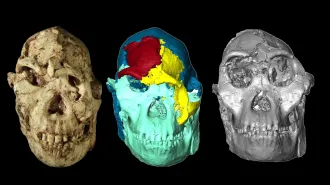BOSTON – Within the quiet pages of books, words are battling it out with a competitive fierceness that rivals Wall Street’s. New research examining the frequency of words used in books over more than 200 years reveals the rise and demise of various words through time and how social, technological and political change influence language.
An international team of scientists investigated word histories using Google’s Ngram project, a database of words in seven languages developed from scanning and digitizing about 4 percent of the world’s texts. The researchers mined books printed in English, Spanish and Hebrew published between 1800 and 2008, a corpus of more than 10 million words.
There’s a marked increase in the death rate of words that coincides with the modern print era, the researchers found. That trend intensified with the advent of stricter publishing procedures, and later computerized editing and spell-checking technologies, which led to the extinction of various misspelled words or less-popular synonyms.
Incorrect or nonstandard spellings weren’t the only cause of word death. Roentgenogram — which comes from Wilhelm Röntgen, who discovered X-rays — faced competition from radiogram and X-ray, which ultimately triumphed, Joel Tenenbaum reported February 28 at a meeting of the American Physical Society.
“Each of the words is competing to be a monopoly on who gets to be the name,” said Tenenbaum, of Boston University. He conducted the research with Alexander Petersen of IMT Lucca Institute for Advanced Studies in Italy and others. “Of, the, an — those are the blue chips of words, like Microsoft,” Tenenbaum said.
Political forces may also shape the trajectory of a word or phrase, the researchers found. “The Great War,” for example, which was used to describe World War I, fell out of use around 1939 when people realized it wasn’t actually the war to end all wars.
And wars shaped language in other ways. There’s a marked spike in the birth rate of Hebrew words around 1920 following a surge in political and popular endorsement of the creation of a national homeland for the Jewish people. Hebrew had been primarily used in religious texts but then surged as a modern, spoken language.
An intriguing open question is whether a thorough examination of phrases would yield similar trends, said Paul Ginsparg of Cornell University. Indeed: Google has gone from being an extremely large number (spelled googol) to a verb that’s typically attached to the term “it.”







